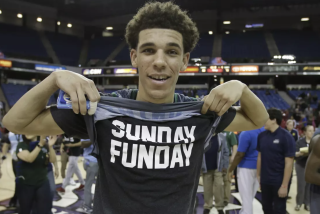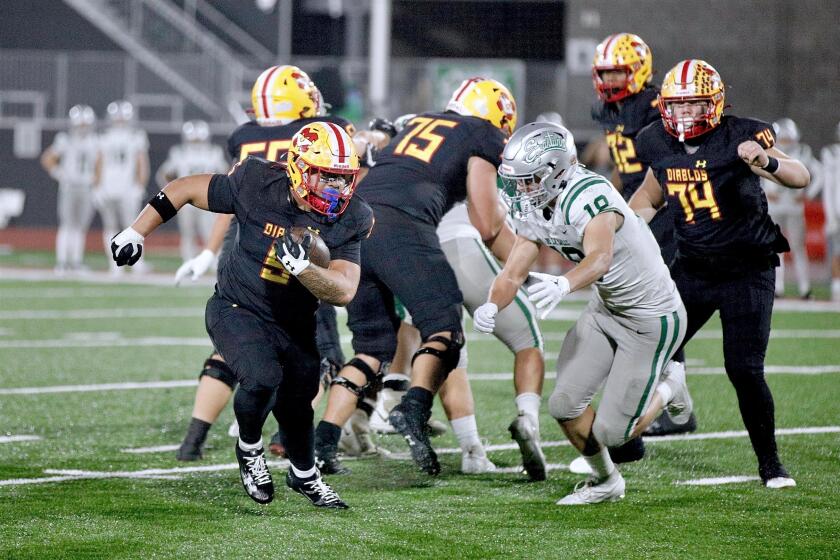Tall Tale: Courting Trouble
Wherever he goes, he is the center of attention. And no wonder. He is barely 18 years old and 6 feet 11. A basketball player. A prospect. And you can’t teach height, you know.
How else do you explain the swirl around an Australian teenager whose athletic potential prompted his mother to turn over guardianship and send him to the United States three years ago on a stack of promises.
Like so many other foreign-born basketball players who have come here in recent years, Martin Iti arrived with a dream.
Others around him had a plan:
He would sharpen his playing skills, earn a high school diploma, sign with his choice of college basketball juggernauts, then cash in when it was time to turn pro.
Today, those plans are a shambles.
Iti is serving a yearlong athletic suspension at Villa Park High and is barred from returning to high school basketball in California for his senior season because his eight semesters of eligibility have expired.
As a student, his situation isn’t much better. After transfers involving four high schools and a junior high in three states, Iti is barely on track to graduate.
His guardian has taken him on a roundabout tour of the U.S. that has included two stops in Orange County and others in Arizona, Nevada, Colorado and Florida, prompting his mother to demand her son’s return.
The situation escalated into a standoff at Los Angeles International Airport, where Iti defied his mother’s wishes for him to board a Sydney-bound plane. Eventually, she softened her stance in return for the guardian’s word that Iti would finish school at Villa Park.
Now, even that seems in doubt. Iti has returned to Australia to visit his mother, and it is unclear whether his immigration status will allow him to reenter the U.S.
Iti’s travels and eligibility issues have sparked probes by the Orange Unified School District, the Colorado High School Activities Assn. and the NCAA. The California Interscholastic Federation’s largest branch, the Southern Section, which governs 519 high schools in Southern California, has launched its own investigation.
Jack Hayes, recently retired commissioner of the CIF, said the matter involving Iti is not unique.
“We have grave concerns about the importation and manipulation of foreign players by agents and others and the resulting corruption of high school basketball,” he said.
Just last fall, three foreign players who transferred to Van Nuys Montclair Prep were declared athletically ineligible because they did not arrive through a bona fide foreign-exchange program.
Lakewood Artesia had to forfeit a Southern Section championship last year after it was determined that the team included transfers from the Dominican Republic and Iceland who held fake student visas.
Villa Park Principal Fran Roney, who spent weeks trying to reconstruct the trail that ultimately led Iti to her school, said people who transplant foreign students solely for athletic reasons “compromise the integrity of the purpose of athletics in our high schools. Athletics are supposed to be a complement and a supplement to an education program.”
Iti’s guardian, Courtney Rosegreen, said he’s always had Iti’s best interest at heart. He is no longer discussing the matter, and has barred Iti from speaking with reporters.
Iti’s move to the U.S. didn’t turn out exactly as planned, but it has offered some advantages. He at least temporarily escaped a crime-ridden suburb of Sydney. And, if nothing else, he is closer to getting a college education that could never have been provided by his seamstress mother, a Cook Islander from New Zealand who moved to Australia and raised Iti single-handedly.
After all his travels and troubles, at least one major college basketball program--USC--has expressed interest in Iti, who is rated among the top 30 juniors in the U.S. by the Sporting News.
Why would major colleges want a largely unproven player who isn’t even playing?
You can’t teach height, you know.
Coming to America
Already 6-8 at 14, Iti was passing through a Sydney train station in early 1997 when he was stopped by a stranger, who asked if he played basketball.
That was Edward Smith, the director of an Australian youth basketball program. He promised Iti right then and there that he could help him attain what Iti said was his goal--playing in the NBA.
After helping Iti hone his game for eight months, Smith persuaded Iti’s mother, Legina Lovinia Paraita, to send her son to play high school basketball in the U.S. There, Smith said, Iti could flourish athletically and academically.
Smith arranged to have Rosegreen, an American friend, serve as Iti’s guardian and cover most of his expenses. Rosegreen was familiar with the U.S. basketball system because he had played for Chaminade University in Honolulu, and his brother Warren played for Nevada Las Vegas.
After brief stops in Arizona and Nevada upon their arrival in May 1998, Courtney Rosegreen and Iti settled in Denver.
Rosegreen then turned his attention to finding a school for Iti.
Iti registered at Denver East High but soon transferred to nearby Webber Junior High, where ninth graders are eligible to play varsity sports at adjacent Rocky Mountain High. Several weeks later, it became clear that Iti would have to display his skills elsewhere.
After reviewing Iti’s records, Commissioner Bob Ottewill of the Colorado High School Activities Assn. ruled in October 1998 that Iti was ineligible because he was not a foreign exchange student and his parents had not moved with him.
Within days, Iti left Webber Junior High and the home of Tim Gilmour, whose family had hosted him.
A few months later, Gilmour said, an NCAA investigator came to Denver and asked him detailed questions about Iti’s travels and his relationship with Rosegreen.
An NCAA spokeswoman, per policy, would not confirm that account. Other acquaintances of Iti and Rosegreen in Colorado said the NCAA had not contacted them.
In early November, Iti enrolled at Cardinal Gibbons High in Fort Lauderdale, Fla., a basketball powerhouse that boasts prominent alumni such as Clipper point guard Keyon Dooling.
Iti started playing for Gibbons late in the season but did not develop into the standout player he was purported to be.
After the season, Rosegreen was looking to move again. A friend put him in touch with Bob Gottlieb, coach of an AAU team in Southern California.
In September, while Iti played for Gottlieb’s traveling team, Gottlieb introduced Rosegreen to Roger Hogan, who owns a car dealership in Claremont. Rosegreen began working for Hogan as a salesman and Iti enrolled at Servite, where two of Hogan’s sons played basketball.
“This was just a good kid looking for a good place to call home,” Hogan said. “He deserved that opportunity.”
Iti’s immigration status soon threatened that opportunity. He had entered the U.S. in May 1998 as a “visa-waivered” tourist, which allowed him to visit the country for 90 days. By now, he had been in the U.S. for about 18 months.
Servite Principal Raymond Dunne said he repeatedly requested immigration records showing that Iti was attending school here legally. In January 2000, after the records failed to materialize despite several promises from Rosegreen, Dunne mailed the guardian a letter informing him that Iti would not be allowed to return to Servite for the next school year if the records were not produced.
Through it all, Iti continued to play basketball for the Friars, averaging 12 points and 7.6 rebounds for a team that reached the second round of the playoffs.
In April, a little more than a month after the season ended, Iti and Hogan’s son Kyle transferred to Villa Park.
Hogan said his son’s transfer had nothing to do with Iti.
“The transfer of my kid is a family matter between ourselves and Servite,” he said.
Roney, the Villa Park principal, undertook an investigation to make sure no one had exercised “undue influence”--a violation of Southern Section rules--to trigger the move. But after determining there was “too much gray area” to make a definitive judgment, she dropped her inquiry.
A new home
Iti appeared to have finally found a home at Villa Park, which has a basketball team that consistently ranks among the best in Orange County.
But Paraita, Iti’s mother, became furious when she learned of her son’s fourth transfer in less than two years. When Rosegreen brought Iti to the U.S., the plan had been to stay with Rosegreen’s family in Fort Lauderdale.
Paraita decided it was time for Iti to come home, and turned to the Australian coach, Edward Smith, for help. She filed paperwork establishing Smith’s sister, Nadja Bonhomme, as Iti’s new U.S. guardian. Shortly thereafter, Bonhomme traveled from her home in Maryland, arriving at Villa Park with Orange County sheriff’s deputies.
After showing her documents to Orange Unified School District officials, she took Iti to LAX, where he was to take a flight back to Sydney.
Iti never boarded the plane.
About an hour before departure, Rosegreen arrived and summoned airport police, who examined both parties’ documents claiming guardianship. Iti said authorities asked him what he wanted to do.
“I said, ‘I don’t want to go,’ ” said Iti, who then left the airport with Rosegreen.
The next day, Paraita accused Rosegreen and others of using her son because of his height and athletic promise.
“If my son was a 4-11 Australian citizen in America, he would be on the next plane home,” Paraita said in a written statement from Australia. “I am sick and tired of you people using my son as if he is a piece of meat.”
At the time, Iti came to Rosegreen’s defense, saying, “He always asks me what I want.”
Rosegreen said, “I treat him like he was my own son.”
The fight for Iti became so contentious that Rosegreen hired an attorney, who filed a petition in Orange County Superior Court seeking to allow Rosegreen to keep custody. The matter was settled out of court when Paraita gave up her fight when Rosegreen promised that Iti would complete high school at Villa Park.
Paraita said she no longer has any concerns about Rosegreen’s serving as her son’s guardian.
“He has looked after the boy,” she said. “I’ve nothing against him.”
Iti continued to develop his game over the summer while playing for the AAU California All-Stars traveling team. He was selected as most valuable player in an all-star game involving juniors after scoring 18 points, grabbing 13 rebounds and blocking six shots.
But last fall, he was a player without a team.
Villa Park declared him athletically ineligible in early September, after Orange Unified officials determined that Iti had misled them about his academic status when he left Australia.
The officials obtained documents from Dulwich High, showing that Iti was in the 10th grade when he left Australia. Iti had insisted he’d been in the ninth grade. The difference was significant because it would affect Iti’s remaining athletic eligibility.
Iti’s attorney, contending that his client was confused about his academic status, appealed. And in a scene reminiscent of “Ferris Bueller’s Day Off,” Villa Park students circulated a petition to save Iti’s athletic eligibility.
The CIF affirmed Iti’s suspension, ending his hopes for a return to the basketball court before graduating. And then it went further, directing the Southern Section to start a wide-ranging investigation on foreign athletes competing at local high schools. That probe is still underway.
“We want to get a picture of foreign athletes and [whether] they are being shipped over here strictly for the purpose of showcasing their athletic abilities,” Southern Section Commissioner Jim Staunton said.
What now?
After completing first-semester exams in late January, Iti flew back to Sydney to visit his mother. He has not returned.
His case has provided the impetus for both soul searching and policy review.
Smith, the Australian basketball director, said he regrets his involvement in the matter and now counsels parents not to send their children abroad until they’re college-age.
Hayes, who retired as commissioner at the end of February, said the CIF needs to be tougher with regulations and enforcement to discourage such activities.
Roney, Villa Park’s principal, said she suspects--although she also admits she cannot prove it--that Iti has been misguided by adults.
Paraita, Iti’s mother, still believes that it was in her son’s best interest to come to the U.S., and she is leaning toward sending Iti back to Villa Park.
“I want him in one place,” she said. “You don’t want your child going six months here, six months there.”
Rosegreen, meanwhile, is no longer working at the car dealership and has left his Orange apartment. Efforts to contact him this week were unsuccessful.
Back at Villa Park, the second semester has started without Iti, who turned 18 Wednesday. He has already missed a month of classes. Immigration officials say he must obtain a student visa through the U.S. State Department to reenter the country legally. If he returns to school soon and continues to take a full course load, the Villa Park principal said he could graduate on schedule in June 2002.
His return to Villa Park is far from certain, though.
Bob Hubbard, the coach at Las Vegas Bishop Gorman High, said that since December, he has been contacted by Rosegreen and his brother Warren, both expressing interest in having Iti play there.
In the end, it may not matter where Iti finishes high school. Before traveling back home to Australia, he was seen behind the USC bench during games.
The Trojans can’t comment, but sources say they are still recruiting him.
*
Correspondent Gerard Wright contributed to this story.
More to Read
Get our high school sports newsletter
Prep Rally is devoted to the SoCal high school sports experience, bringing you scores, stories and a behind-the-scenes look at what makes prep sports so popular.
You may occasionally receive promotional content from the Los Angeles Times.







